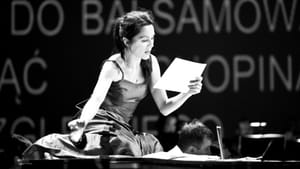Stay in the Loop
BSR publishes on a weekly schedule, with an email newsletter every Wednesday and Thursday morning. There’s no paywall, and subscribing is always free.
A perverse concept
'Chopin without Piano' at Fringe Arts

Chopin without piano — what a dare; no, what a perverse concept. What does this even mean? How can you isolate the greatest composer for the piano from the instrument itself?
The production featured the performance of both of Chopin’s piano concertos, in succession, with a full orchestra (courtesy of the superb Chamber Orchestra of Philadelphia), but with the solo piano part replaced by a solo declaimed narrative (in Polish with subtitles) written by Barbara Wysocka, who also was the performer. Okay, let’s buy in, for the moment. Chopin was a musician, one of the great composers of all time, but, in a generic sense, he was also an iconic cultural and historical figure, an inspiration for millions beyond the world of music.
That is certainly the spirit of Wysocka’s text, most strongly emphasized in the final movement of the second concerto, which includes a reading of the General Jaruzelski’s 1981 declaration of martial law (the last Communist leader of Poland read that declaration to the background of Chopin’s music). In a piercingly ironic way, Wysocka is attempting to rescue Chopin from this obscene highjacking of his art. She comments: “His piano radicalism — there is no other way to describe it — his piano radicalism leaves a trail of destruction, disruption, vandalism. His life was a thirty-nine-year-long ordeal.”
“You think it’s lyrical . . .”
Wysocka is a classically trained violinist, a background frequently revealed in her insightful remarks. At the opening of the second concerto she declares, in the rhythm of the Maestoso direction, “this theme is lyrical, but underpinned by the horror of a chromatically descending bass. A trap — you think it’s lyrical, but it’s really about death.”
Another thoughtful touch was setting some of Chopin’s letters to the dreamy, bittersweet Romance of the first concerto, in which the consumptive composer mainly complains about his health. “After this cough strangles me, swear that you will make them break open my body so that I won’t be buried alive.” Wysocka recalls that morbid sentiment at the conclusion of the second concerto, as she repeatedly chants, “I don’t want to be buried alive,” in the Allergo Vivace tempo of the music.
Clearly some of the text was chosen more for odd, if affecting, gestures rather than for literal meaning. Elsewhere, Wysocka is more straightforward, including her own childhood memories of discovering the music and quotes on Chopin’s music from critics across the years. It is a compelling mélange of source material.
She did not sing pitched notes, but there is no denying that Wysocka’s delivery was musical: It was matched with her athletic movement (including a leap onto the closed lid of a grand piano) in a way that can best be described as operatic. Some of her theatricality crossed the line into sensationalism, but the overall effect of the performance was highly stimulating, as Wysocka revealed a vivid sense of history and also a deep love for the music of Chopin.
But that did not suppress my strong desire, when arriving home, to sit down at the piano and play a Chopin waltz.
What, When, Where
Chopin without Piano. Chopin Piano Concertos Nos. 1 and 2, with text by Barbara Wysocka and Michał Zadara. Chamber Orchestra of Philadelphia conducted by Bassem Akiki, soloist Barbara Wysocka. Michał Zadara directed. October 28-31, Fringe Arts, 140 N. Columbus Blvd., Philadelphia. 215-413-1318 or fringearts.com.
Sign up for our newsletter
All of the week's new articles, all in one place. Sign up for the free weekly BSR newsletters, and don't miss a conversation.
